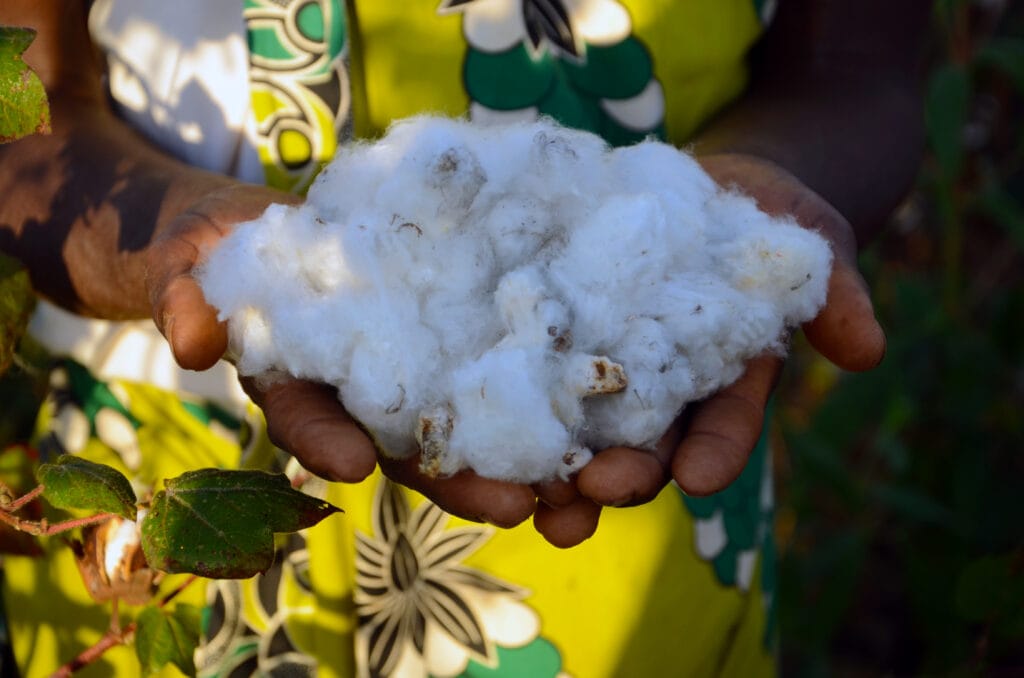2025 Outlook: Q&A With CEO Alan McClay
As 2025 begins, we took the opportunity to sit down with our CEO Alan McClay to hear about his reflections on 2024 and his vision for the year ahead.
Read moreAs 2025 begins, we took the opportunity to sit down with our CEO Alan McClay to hear about his reflections on 2024 and his vision for the year ahead.
Read moreSupported by the Better Cotton Innovation Fund, ag-tech provider GROWERS and the Soil Health Institute (SHI), Zeb Winslow is implementing soil and plant testing to gather data to improve his land and yields.
Read moreBetter Cotton Pakistan has signed a Memorandum of Understanding (MoU) with the Pakistan Textile Council (PTC) to promote more sustainable cotton production, strengthen engagement with national and international stakeholders, and develop market linkages amid a changing legislative landscape.
Read moreOur fourth annual Large Farm Symposium was attended by over 100 participants, with topics including crop management and biological controls in the face of pest and disease pressure, and advocacy around building a stronger case for natural fibres amid the rapid rise of synthetics.
Read moreAs 2024 draws to a close, it’s the perfect time to look back on another year of progress in supporting the more equitable and sustainable production of cotton.
Read more

In this Q&A, Hélène Bohyn, Policy & Advocacy Manager at Better Cotton, discusses why Better Cotton has joined the Make the Label Count coalition and our role in advocating for a revision of the European Commission’s Product Environmental Footprint (PEF) methodology. Hélène shares her insights into the coalition’s goals, ongoing efforts to combat greenwashing, and how Better Cotton plans to support the cause in 2025.


Better Cotton’s support for the Make the Label Count coalition reflects our broader commitment to advancing genuine sustainability in the fashion and textile sectors.
We have joined this coalition to advocate for a revision of the European Commission’s Product Environmental Footprint (PEF) methodology. The coalition, which includes over 55 natural fibre organisations and environmental groups, argues that the current PEF methodology fails to adequately account for environmental impacts unique to synthetic fibres. These include microplastic release, post-consumer plastic waste, and the non-renewable nature of these materials.
If these three key environmental indicators are not included in the PEF methodology – which is likely to not be finalised before the adoption of the Green Claims Directive – the coalition will advocate against its use as the go-to method for substantiating green claims under the Directive.
Through this partnership, we aim to champion cotton as a natural fibre and advocate for the inclusion of environmental indicators that capture the complete lifecycle and impact of each fibre. This would play a key role in eradicating greenwashing and ensuring that sustainability information in the fashion and textile sectors is fair, transparent, and credible.
Increasing recognition of the sustainability attributes of natural fibres like cotton: Cotton offers significant environmental and social benefits compared to synthetic alternatives, which are derived from fossil fuels. Unlike man-made fibres, cotton is biodegradable, has a lower carbon footprint during disposal, and supports the livelihoods of millions worldwide by preserving cultural traditions and providing vital employment opportunities. By raising awareness of these attributes, we aim to encourage members to prioritise natural fibres over synthetics, fostering a potential shift in consumer preferences and industry practices toward more sustainable materials.
Influencing EU policy: Joining the coalition allows us to advocate for a more holistic and equitable approach to evaluating the environmental impact of textiles. This means influencing EU regulators as well as enhancing the visibility and recognition of voluntary sustainability standards like Better Cotton within the fashion and textile industry.
Enhancing accuracy in sustainability metrics: Adopting the proposed changes to the methodology would ensure that sustainability metrics more accurately reflect the environmental impact of different textile fibres, leading to fairer and more meaningful assessments.
Reducing greenwashing: By advocating for comprehensive and transparent data, we aim to work towards the eradication of greenwashing. This would ensure sustainability claims are credible and help consumers make informed choices.
In the first quarter of 2025, a pivotal decision-making moment will occur when the European Commission, European Parliament, and European Council (collectively known as the trilogue) come together to vote on the Green Claims Directive and the preferred methodology for evaluating sustainability metrics in textiles.
In the lead-up to this decision, the coalition is now focusing its efforts on engaging with the European Commission, Members of Parliament as well as the European Council Attachés and their respective Member States working on the file to advocate for a methodology that accurately reflects the true environmental impact for textile products. To advance this agenda and support the coalition’s objectives, we will prioritise the following actions in 2025:
Participating in meetings: We will actively engage in meetings with coalition members and policymakers organised by the coalition to ensure our perspective is included in discussions that shape future regulations.
Increasing visibility and influence: We will promote the coalition by speaking about it in public forums, encouraging others to join, and leveraging high-profile opportunities to raise awareness and build momentum.
Responding to EU public consultations: We will submit aligned feedback in response to EU calls for evidence and public consultations, such as those recently provided on the Digital Product Passport, ensuring our contributions echo the demands of the coalition.
Engaging with voting members: We will explore opportunities to engage with voting members among EU Member States, and retailers and brands within our membership, fostering dialogue and raising awareness about the coalition’s goals to encourage their support for the initiative.
Interested in learning more? Get involved and join us in the journey to make the label count.
Read more

Better Cotton has announced a one-year extension of its standard recognition agreement with its Strategic Partner in Israel, the Israel Cotton Production and Marketing Board (ICB). The ICB is a farmer-owned producer organisation (cooperative) representing cotton farmers across the country.
Since 2020, the organisation’s Israel Cotton Production Standard System (ICPSS) has been recognised as equivalent to the Better Cotton Standard System (BCSS), enabling domestic farmers to sell their cotton as ‘Better Cotton’ in international markets.
In the 22/23 cotton season, 80 farmers attained an ICPSS certificate from ICB, producing more than 17,300 metric tonnes of Better Cotton, representing 99% of the country’s production for the season.
Israel’s cotton sector, though small in size, is recognised as a world leader in research and development, culminating in new seed and plant varieties, technological innovations and improved crop quality and yields.
Following the ICB’s success in aligning its field-level requirements with Better Cotton’s updated Principles & Criteria (P&C) v.3.0, the revised ICPSS will be fully implemented by the 2025/26 season.
Better Cotton requires Strategic Partners to periodically reassess and, where necessary, realign their standards with the BCSS to ensure that their objectives remain consistent and that they too evolve to continually support the needs of cotton farmers.
Notes to Editors:
Better Cotton Strategic Partners operate equivalent sustainable cotton programmes that align with and are benchmarked against the Better Cotton Standard.
Read moreHow can we effectively adopt biodiversity practices into agricultural systems on a global scale? A recent case study in Punjab, Pakistan, offers valuable insights.
Read moreTakeaways from the 2024 Southern Soil Health Conference in Jonesboro, Arkansas, US.
Read more

Better Cotton CEO, Alan McClay, has announced his retirement and will leave the organisation in October 2025.
McClay has led Better Cotton since 2015, in which time the organisation has grown to become a global force for sustainable change in cotton production. His vision, unwavering dedication, and personal commitment to the organisation’s mission has helped drive transformative change across the sector.
Over the next year, McClay will remain in his role and retain his existing responsibilities to ensure a seamless and transparent leadership transition. An extensive and thorough recruitment process, managed by the Better Cotton Council, will take place in parallel, providing ample time to identify and finalise the appointment of his successor.
Better Cotton remains committed to supporting the production of more sustainable and equitable cotton.
Read moreBetter Cotton is joining more than 50 natural fibre organisations and environmental groups in supporting calls for an urgent revision of the European Commission’s Product Environmental Footprint (PEF) methodology.
Read moreWe caught up with Better Cotton’s COP29 delegation to hear about the key lessons they will take away from the conference.
Read more